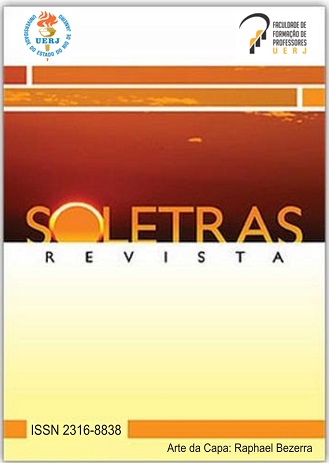Exploring the productivity and systematicity of Recipient passives in Mozambican Portuguese
DOI:
https://doi.org/10.12957/soletras.2023.73486Palavras-chave:
recipient passives, Mozambican Portuguese, ditransitives, pluricentricity, construal.Resumo
This study aims to explore and provide a detailed description of the construction known as “Dative passives” or Recipient passives in the Mozambican variety of Portuguese, in the framework of Cognitive Grammar (LANGACKER, 1991, 2008) and Construction Grammar (GOLDBERG, 1995, 2006). Particular attention will be paid to the complex semantic categories of passive and ditransitive structures in order to identify which of their conceptual aspects lay behind the emergence of Recipient passives. By means of a corpus study based on the Corpus do Português (DAVIES, 2016), it will be shown that this construction is found with a wide range of verbs of transfer, thus showing increasing signs of productivity, and that the variation displayed by Mozambican Portuguese is not random but systematic, occurring in well-defined semantic contexts. Furthermore, adopting a constructional approach to the variation at hand provides a strong argument against considering Recipient passives as derived from Double Object constructions, a claim often made in the literature (GONÇALVES 1990, 1996, 2010). By doing so, this study also offers to delve deeper into the pluricentricity of Portuguese, a tendency that is furthermore bound to increase in the near future (SOARES DA SILVA, 2022).
Downloads
Publicado
Edição
Seção
Licença
A aprovação dos artigos implica a cessão imediata e sem ônus dos direitos de publicação nesta revista. O(s) autor(es) autoriza(m) ao Programa de Pós-graduação em Letras e Linguística (PPLIN) a reproduzi-lo e publicá-lo na revista SOLETRAS, entendendo-se os termos “reprodução” e “publicação” conforme definição do artigo 5° da Lei 9610/98. O(s) autor(es) continuará(rão) a ter os direitos autorais para publicações posteriores. O artigo poderá ser acessado pela rede mundial de computadores (http://www.e-publicacoes.uerj.br/index.php/soletras), sendo permitidas, a título gratuito, a consulta e a reprodução de exemplar do artigo para uso próprio de quem o consulta. Casos de plágio ou quaisquer ilegalidades nos textos apresentados são de inteira responsabilidade de seus autores.



